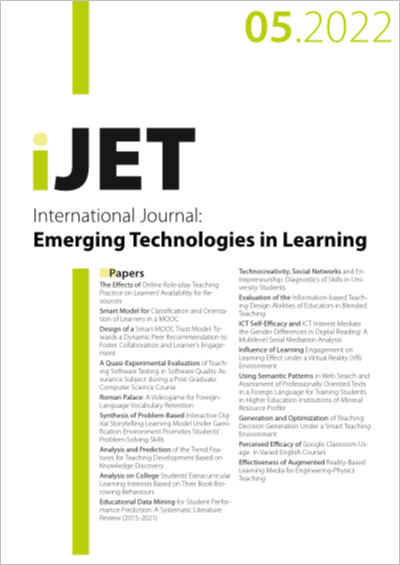Design of a Smart MOOC Trust Model: Towards a Dynamic Peer Recommendation to Foster Collaboration and Learner’s Engagement
DOI:
https://doi.org/10.3991/ijet.v17i05.27705Keywords:
Trust Management System (TMS), Social Internet of Things (SIoT), Machine Learning (ML), Smart Education, Massive Open Online Course (MOOC), Peer Recommendation.Abstract
Recent evolutions in the Internet of Things (IoT) and Social IoT (SIoT) are facilitating collaboration as well as social interactions between entities in various environments, especially Smart Learning Ecosystems (SLEs). However, in these contexts, trust issues become more intense, learners feel suspicious and avoid collaborating with their peers, leading to their demotivation and disengagement. Hence, a trust management system (TMS) has become a crucial challenge to promote qualified collaboration and stimulate learners' engagement. In the literature, several trust models were proposed in various domains, but rarely those that address trust issues in SLEs, especially in MOOCs. While these models exclusively rank the best nodes and fail to detect the untrustworthy ones. Therefore, in this paper, we propose Machine Learning-based trust evaluation model that considers social and dynamic trust parameters to quantify entities' behaviors. It can distinguish trustworthy and untrustworthy behaviors in MOOCs to recommend benign peers while blocking malicious ones to build a dynamic trust-based peer recommendation in the future phase. Our model prevents learners from wasting their time in unprofitable interactions, protects them from malicious actions, and boosts their engagement. A simulation experiment using real-world SIoT datasets and encouraging results show the performance of our trust model.
Downloads
Published
2022-03-14
How to Cite
Elghomary, K., Bouzidi, D., & Daoudi, N. (2022). Design of a Smart MOOC Trust Model: Towards a Dynamic Peer Recommendation to Foster Collaboration and Learner’s Engagement. International Journal of Emerging Technologies in Learning (iJET), 17(05), pp. 36–56. https://doi.org/10.3991/ijet.v17i05.27705
Issue
Section
Papers
License
Copyright (c) 2022 khadija elghomary, Driss Bouzidi, Najima Daoudi

This work is licensed under a Creative Commons Attribution 4.0 International License.



